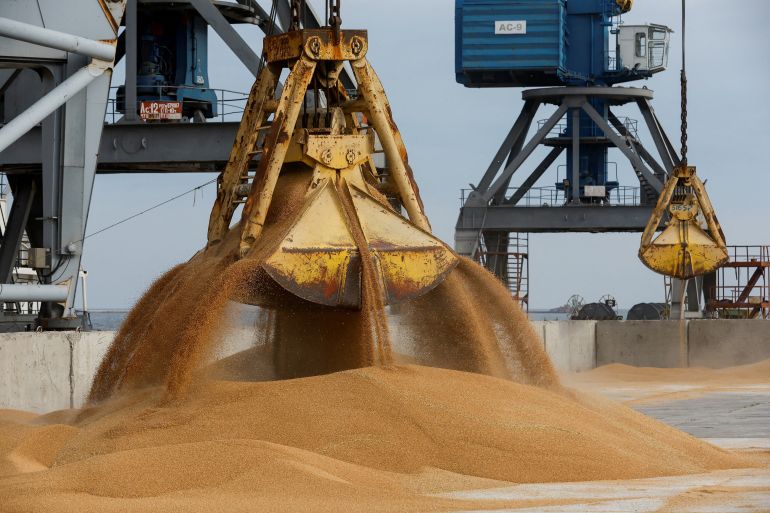Russia has sent 50,000 tonnes of wheat to the Central African Republic to address concerns about a potential food crisis following its withdrawal from a grain export deal with Ukraine.
In a statement released on Monday, the Russian Foreign Ministry confirmed that this action is part of Russia’s commitment to extending humanitarian assistance to African nations, as outlined during the Second Russia-Africa Summit in St. Petersburg in July 2023.
“The unloading of two vessels carrying Russian grain was completed at the port in the city of Douala (Cameroon) on January 25,” the statement reads. “An agreement between Bangui and Yaounde involves milling the grain into flour in Cameroon and then transporting it to the Central African Republic.”
The ministry emphasized its readiness to contribute to solving urgent humanitarian issues, citing its past assistance to the Central African Republic during the Covid-19 pandemic. The Russian Emergency Situations Ministry delivered eight tonnes of medications and medical supplies in September 2020, followed by a 540-tonne batch of agricultural products in August 2022 as a voluntary contribution to the UN World Food Program (WFP).
In 2023, Russia allocated $2.5 million through the WFP for additional food supplies, expected to reach the Central African Republic in the coming months.
Authorities in the Central African Republic expressed gratitude to the Russian leadership for the humanitarian assistance, recognizing its significance in covering the needs of the most vulnerable populations and ensuring food security in the country.
This initiative aligns with Russian President Vladimir Putin’s commitment to preventing a global food crisis. In 2023, President Putin pledged to provide six African countries, including the Central African Republic, with 25,000-50,000 tonnes of grain free of charge, replacing Ukrainian grain exports blocked by Moscow’s decision to withdraw from the arrangement brokered between Ukraine and Russia by Türkiye and the United Nations (UN).
Russia has long faced obstacles in exporting grain and fertilizers. While there are no direct sanctions against Russian agricultural exports, Moscow argues that other sanctions discourage international banks, shipping firms, and insurers from doing business with Russian producers.
The Kremlin has put forward several requests, including the reinstatement of the Russian Agricultural Bank into the SWIFT global payment system, the resumption of farm equipment exports to Russia, and the removal of limitations on insurance and port access for Russian ships and cargo.
Additional demands from Russia include the restart of the Togliatti-Odesa ammonia pipeline, enabling the transportation of ammonia to Ukraine’s main Black Sea port, and the unblocking of assets and accounts of Russian companies involved in food and fertilizer exports.
Ammonia is a crucial component in fertilizer production, and Moscow insists that Ukraine allows its exports through the port of Odesa.
Many African countries heavily depend on Russia and Ukraine for their grain imports. Between 90-100 percent of the wheat for Somalia and Eritrea comes from these two countries.
Ukraine and Russia are significant food suppliers, accounting for 29 percent of wheat exports and 80 percent of sunflower exports globally, mainly through the Black Sea.
Ukraine, often referred to as one of the world’s breadbaskets, is a top grain supplier to numerous developing nations. In 2021 alone, the country’s grain exports reached $12.2 billion, constituting nearly a fifth of its total exports.







 Azerbaijan has been recognized as one of the safest countries in the world, ranking 90th among 163 countries on the Global Terrorism Index 2025 (GTI).
Azerbaijan has been recognized as one of the safest countries in the world, ranking 90th among 163 countries on the Global Terrorism Index 2025 (GTI).
 The Azerbaijani Defense Ministry has reported ongoing shelling of its army positions by Armenian forces since last week.
The Azerbaijani Defense Ministry has reported ongoing shelling of its army positions by Armenian forces since last week.
 On Monday, Israel awarded gas exploration licenses to a consortium that includes Azerbaijan’s energy conglomerate SOCAR, bp, and Israel’s NewMed En...
On Monday, Israel awarded gas exploration licenses to a consortium that includes Azerbaijan’s energy conglomerate SOCAR, bp, and Israel’s NewMed En...



